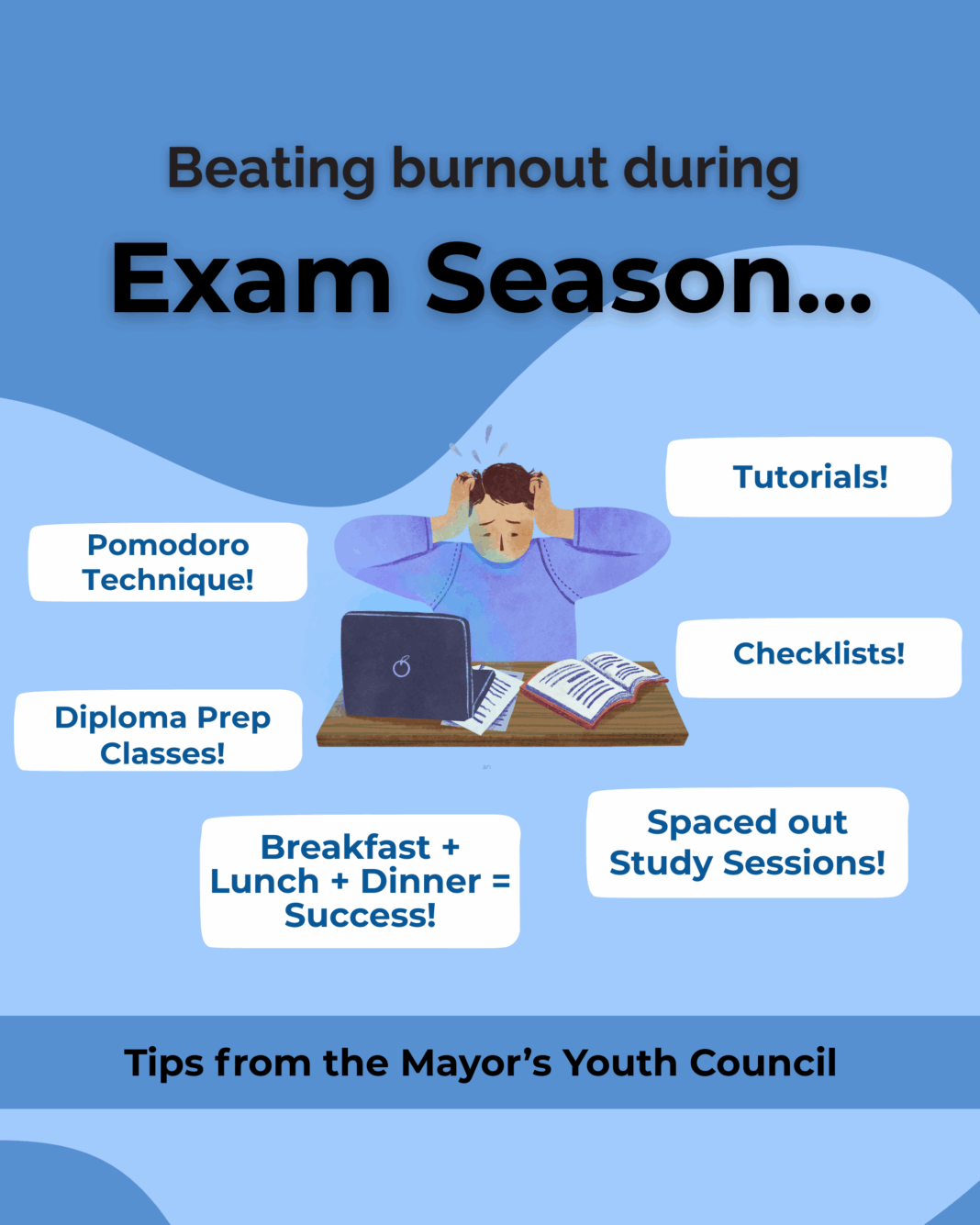Introducing the Mayor’s Youth Council Health and Well-Being Column! Each month, we’ll share fun, relevant, easy-to-follow mental health tips through the Youth Central newsletter, giving you the tools and support to prioritize your well-being with new topics and advice every month!
Hello everyone! June is here, which is our month of the “last push.” Congratulations to students who have successfully completed IB and AP exams! While those difficult exams are behind us, there are still final exams and diploma exams ahead. Our Mayor’s Youth Council Health and Wellbeing Committee wanted to dedicate this month’s newsletter to help you stay balanced, focused, and well — physically, mentally, and emotionally — during one of the most intense academic times of the year.
- Enroll yourself in diploma prep classes!
Did you know that collaborative learning improves retention? A 2020 study published in Cognitive Research: Principles and Implications showed that reviewing material with expert guidance and peers boosts understanding and long-term memory. Benefits of diploma prep classes include reinforcing key concepts with expert instructors, gaining more experience with practice exam-style questions, learning test-taking strategies, and feeling supported by peers who are going through the same thing. Check with your school or school board for diploma prep opportunities in your area! - Space Out Your Study Sessions (The Spacing Effect)
Cramming is tempting, but harmful. The brain retains information best when we review it over time. A study from Psychological Science found that longer intervals between study sessions led to better long-term retention. This is called the Spacing Effect, and it helps your brain form long-term memory. When studying for exams, try to break big topics into smaller sections, schedule review days, and mix up subjects to keep your brain engaged. We recommend utilizing a flashcard application called Anki, which helps you practice spaced repetition. - Pomodoro Techniques
Have you ever stared at a page for 2 hours and remembered nothing? The Pomodoro Technique may help you!
How it works:
Study for 25 minutes
Take a 5-minute break
Repeat 4 times, then take a 15–30 minute break
This rhythm keeps your focus sharp while giving your brain time to recover.A study titled “Understanding effort regulation: Comparing ‘Pomodoro’ breaks and self-regulated breaks” investigated the effects of systematic (Pomodoro-style) versus self-regulated breaks on mental effort, task experiences, and task completion during real-life study sessions. The findings suggested that taking systematic breaks during study sessions had appeared to offer efficiency benefits—achieving similar task completion in shorter time—compared to self-regulated breaks.
- Make sure to eat properly (especially breakfast!)
A study published in Physiology & Behavior investigated the effects of breakfast consumption on cognitive function in adolescents aged 12 to 15. Participants completed cognitive tests after consuming breakfast and after skipping it. The results showed that breakfast consumption improved accuracy on complex tasks like the Stroop test and visual search tasks, as well as faster response times on memory tasks. Additionally, participants reported higher energy levels and lower feelings of tiredness after eating breakfast. - Brain-friendly foods:
Whole grains (oats, brown rice, whole wheat toast)
Fruits and veggies (especially berries and leafy greens)
Healthy fats (avocados, nuts, olive oil)
Lean proteins (eggs, yogurt, beans) - Make Time for Creativity and Community
Art and connection support your emotional well-being and help prevent burnout! A 2019 study in Art Therapy found that just 45 minutes of creative activity (drawing, painting, journaling, music) significantly reduces cortisol, the body’s main stress hormone. Art also helps express emotions such as empathy, friendship, and support. Try joining an art club with your friends, doodling in your notes, or taking “creative breaks” instead of meaningless screen scrolling.
These exams will pass, but your health and well-being are long-term investments. Every time you choose to study smarter, eat better, take a walk, or pause for art or connection, you’re investing in yourself. Remember, you are capable, resilient, and supported. We believe in you — you’ve got this!
References:
Tullis, J. G., & Goldstone, R. L. (2020). Why does peer instruction benefit student learning? Cognitive Research: Principles and Implications, 5(1). https://doi.org/10.1186/s41235-020-00218-5
Santoro, H. (2021, March 4). The Neuroscience Behind the Spacing Effect. Www.brainfacts.org. https://www.brainfacts.org/thinking-sensing-and-behaving/learning-and-memory/2021/the-neuroscience-behind-the-spacing-effect-030421
Linton, M. (2008). The Maintenance of a Complex Knowledge Base after Seventeen Years (Vol. 35, pp. 127–163). Academic Press. https://doi.org/10.1016/S0079-7421(08)60574-5
Biwer, F., Wiradhany, W., Egbrink, M. G. A. oude , & Bruin, A. B. H. de . (2023). Understanding effort regulation: Comparing “Pomodoro” breaks and self‐regulated breaks. British Journal of Educational Psychology, 93(S2). https://doi.org/10.1111/bjep.12593
Cooper, S. B., Bandelow, S., & Nevill, M. E. (2011). Breakfast consumption and cognitive function in adolescent schoolchildren. Physiology & Behavior, 103(5), 431–439. https://doi.org/10.1016/j.physbeh.2011.03.018

